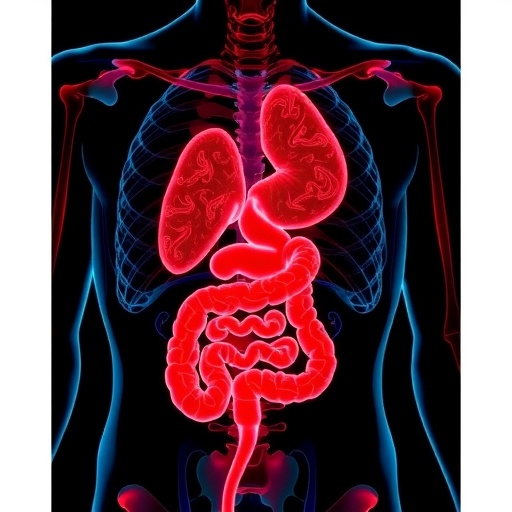When Strokes Unmask a Hidden Cancer: A Unique Case of Metastatic Colorectal Cancer Presenting with Extensive Thromboembolism
A groundbreaking case report published in the latest volume of Oncoscience delivers crucial insights into the intricate relationship between occult malignancies and unexplained thromboembolic events. The study, authored by Md Tanzim Ahsan from Wrightington, Wigan and Leigh (WWL) Teaching Hospitals, NHS Foundation Trust and Sultana Azreen from Clatterbridge Cancer Centre, sheds light on how insidious colorectal cancer can first manifest through systemic embolization and multi-territory cerebral infarctions, dramatically preceding any classical oncologic symptoms.
The narrative centers around a 71-year-old male patient who presented with perplexing symptoms including left arm swelling, persistent headaches, and vague neurological complaints—none of which directly implicated a neoplastic process initially. The clinical trajectory tragically culminated in multiple embolic strokes spanning diverse cerebral vascular territories. Beyond the brain, thrombotic events propagated through vital organs including the lungs, kidneys, and spleen, painting a challenging diagnostic picture. This constellation of findings brought forward complex differential diagnoses such as autoimmune vasculitis or infectious processes.
Advanced multi-modality imaging proved pivotal in unraveling the underlying culprit. Diffusion-weighted magnetic resonance imaging (MRI) revealed multifocal acute infarcts consistent with an embolic pattern devoid of classical cardioembolic sources. Ultrasound assessment identified an enlarged heterogenous lymph node in the supraclavicular region, raising high suspicion for metastatic involvement. Doppler ultrasound further uncovered complete occlusion of the external jugular vein—a telltale sign of malignancy-associated venous thrombosis.
Subsequent histopathological analysis of the biopsied lymph node confirmed metastatic colorectal adenocarcinoma masquerading beneath non-specific clinical presentations. Of particular note, the patient lacked hallmark symptoms often associated with colorectal cancer such as unexplained weight loss, changes in bowel habits, or gastrointestinal discomfort, underscoring the stealthy nature of the disease in this instance.
This case exemplifies Trousseau’s syndrome, a phenomenon frequently underrecognized in clinical neurology and oncology. Named after the 19th-century French physician Armand Trousseau, this syndrome embodies a paraneoplastic hypercoagulable state wherein cancer precipitates widespread thrombotic events. Unlike emboli originating from atrial fibrillation or cardiac valve disorders, these cancer-associated strokes typically involve multifocal cerebral regions without apparent cardiogenic sources, complicating clinical detection.
Laboratory correlations emphasized markedly elevated markers of coagulation activation, especially D-dimer levels, which have emerged as potential harbingers of concealed malignancies in patients presenting with cryptogenic strokes. Their role as adjunctive tools in prompting comprehensive cancer workups is steadily gaining recognition among multidisciplinary care teams managing complex stroke cases.
Clinicians frequently face diagnostic dilemmas when patients exhibit embolic phenomena without traditional cardiovascular risk factors. The study advocates for heightened vigilance and early incorporation of oncological assessment in unexplained hypercoagulable disorders presenting with embolism or stroke, thereby enabling timely diagnosis and intervention. These measures may prove critical in altering the otherwise grim prognosis encountered with advanced metastatic cancers presenting in this atypical fashion.
The case also lays bare the gaps in current clinical guidelines regarding systematic cancer screening for stroke patients with idiopathic embolic patterns. Given the rising global cancer burden, it urges medical communities to prioritize research and consensus-building efforts to develop standardized screening protocols and management pathways that integrate oncologic perspectives into vascular neurology.
Moreover, the authors emphasize that interdisciplinary collaboration remains paramount in tackling such complex clinical scenarios. The integration of neuroimaging expertise, advanced laboratory diagnostics, oncological evaluation, and histopathological confirmation is essential to unmask malignancies masquerading as vascular disorders. Such teamwork ultimately fosters holistic patient-centric care, even when curative options are no longer viable.
From a pathophysiological standpoint, this case underscores the mechanisms by which colorectal cancer orchestrates systemic prothrombotic milieus—through secretion of procoagulant factors, cytokine dysregulation, and endothelial dysfunction—culminating in widespread thromboembolism that significantly contributes to morbidity and mortality. Understanding these intricate biological interactions is essential for researchers and clinicians aiming to innovate targeted therapies that mitigate coagulopathy in cancer patients.
Beyond its clinical implications, this report has significant ramifications for public health strategies aimed at cancer early detection. Incorporating thromboembolic presentations into cancer awareness frameworks could facilitate earlier diagnostic suspicion and streamline referral pathways, ensuring patients receive timely access to oncologic care before disease progression limits therapeutic options.
In conclusion, this meticulously documented case of metastatic colorectal cancer presenting initially through extensive thromboembolism and stroke challenges traditional paradigms in both oncology and vascular medicine. It calls for an expanded clinical lens that recognizes cancer’s protean manifestations beyond classic symptoms, reinforcing the urgent need to refine diagnostic algorithms to improve early identification and intervention outcomes for such elusive malignancies.
Subject of Research: People
Article Title: When strokes reveal a hidden malignancy: An atypical case of metastatic colorectal cancer with extensive thromboembolism
News Publication Date: 15-Sep-2025
Web References: Oncoscience Volume 12
References: DOI 10.18632/oncoscience.626
Image Credits: Copyright © 2025 Ahsan and Azreen; distributed under Creative Commons Attribution License (CC BY 4.0)
Keywords: cancer, Trousseau’s syndrome, cancer-associated stroke (CAS), hypercoagulability, colorectal cancer, systemic thromboembolism




